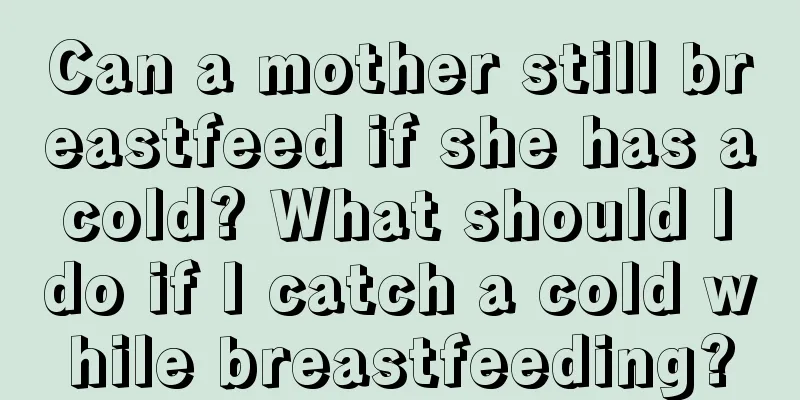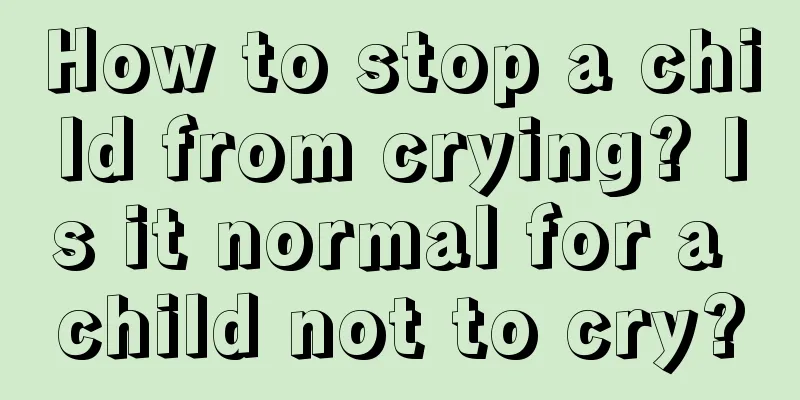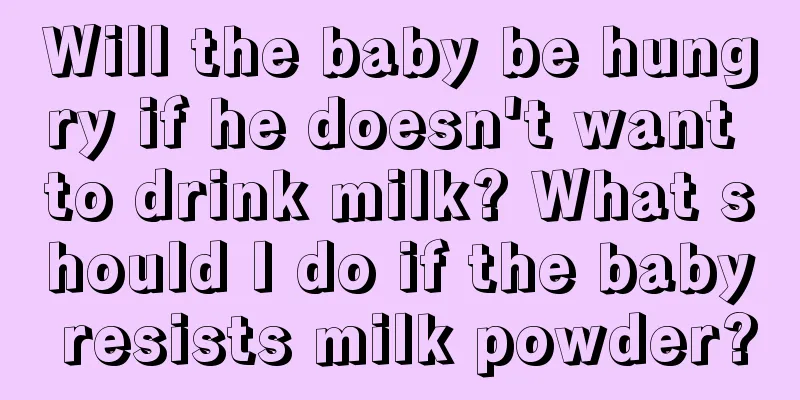Can a mother still breastfeed if she has a cold? What should I do if I catch a cold while breastfeeding?

|
If breastfeeding mothers catch a cold, they must pay attention! Many breastfeeding mothers are confused about whether they can still breastfeed their babies if they catch a cold. Regarding, can mothers still breastfeed if they catch a cold? What should I do if I catch a cold during breastfeeding? The editor will answer them one by one for you! Can mother still breastfeed if she has a cold?In fact, you can continue to breastfeed if you catch a cold during breastfeeding. The most common symptoms of a cold for a breastfeeding mother are fever, sneezing, runny nose, cough, sore throat, etc. Generally speaking, cold viruses are not transmitted through breastfeeding, but through air droplets, so when the mother catches a cold, the environment where the baby lives has already been polluted. Breast milk will produce antibodies on its own, which helps the baby fight against diseases. But if a breastfeeding mother has symptoms of fever, she can stop breastfeeding for one or two days. Therefore, if a breastfeeding mother catches a cold, don't worry too much, just relax and breastfeed your baby. Five rules for catching colds during breastfeeding(1) Do not take medicine at willSome drugs are safe for babies, but some drugs can cause adverse or even very serious reactions, such as pathological jaundice, cyanosis, deafness, liver and kidney damage or vomiting, etc. Therefore, breastfeeding mothers must use drugs with caution. It is wise to tell the doctor that you are breastfeeding when you need to take drugs, and not to take drugs at will. (2) Breastfeeding should not be interrupted at willExcept for a few drugs that are prohibited during breastfeeding, the amount of other drugs secreted in breast milk rarely exceeds 1% to 2% of the dosage used by the mother. This dose will not harm the baby's body. For safe drugs, breastfeeding should not be interrupted. (3) It is not advisable to take contraceptive pillsContraceptive pills contain testosterone, progesterone, and estrogen derivatives. These substances enter the mother's body and inhibit prolactin production, causing milk secretion to decrease, and the secreted breast milk is not enough for the baby. In addition, the active ingredients in contraceptive drugs will enter the baby's body with breast milk, causing the breasts of male babies to become larger and the vaginal epithelium of female babies to proliferate. Therefore, breastfeeding mothers should not use contraceptive drugs. (4) Adjust breastfeeding time after taking medicationWhen taking medication, in order to reduce the amount of medicine absorbed by the baby, the mother can take the medicine immediately after breastfeeding and delay the next breastfeeding as much as possible, at least 4 hours, so that more medicine can be excreted from the mother's body and the drug concentration in the breast milk is minimized. (5) Do not abuse Chinese medicineSome Chinese medicines can nourish yin and blood, promote blood circulation and remove blood stasis for mothers after childbirth, strengthen physical fitness, promote uterine contraction and prevent puerperal infection, but some Chinese medicines will enter breast milk, turn breast milk yellow, or have the effect of weaning, such as rhubarb, roasted malt, Xiaoyao powder, mint, etc. For breastfeeding mothers, if there are any questions about the use of medicines, you may wish to discuss with your obstetrician and gynecologist, pediatrician or pharmacist to ensure the safety of your baby. What to do if you catch a cold while breastfeeding1. When your throat becomes itchy and painful at the beginning of a cold, immediately gargle and rinse your mouth and throat with concentrated salt water every 10 minutes. It will be effective after more than 10 times.2. Drinking chicken soup can relieve symptoms such as nasal congestion and runny nose during a cold, and it has a good effect on clearing respiratory viruses. Drinking chicken soup regularly can enhance the body's natural resistance and prevent the occurrence of colds.3. Use a metal spoon to heat it in boiling water (not to burn your hands) and then place it on the "cold-curing point" on the palm surface to massage. If there is any abnormality in a certain place, massage it more. After a while of hot massage, use a spoon soaked in cold water to stimulate the area. For those with a mild cold or cough, stimulate 5-10 times in the above way. The cold-curing point on the palm is located between the thumb and index finger of the left palm (near the base of the thumb) and on the palm surface below the second joint of the right thumb.4. Pour hot water at about 42°C into a thermos teacup. People with a cold should put their mouth and nose into the mouth of the cup and continuously inhale the hot steam, three times a day.5. If you have a cough, you can beat an egg, add a small amount of white sugar and ginger juice, and take it 2-3 times with half a cup of boiling water to stop the cough.6. When you first catch a cold and feel itchy nose and throat, do the following exercises 2-3 times to recover. The method is: stand upright with your feet slightly apart, straighten your neck, lift your head as high as possible, open your eyes wide, stretch your tongue as long as possible, straighten your fingers, and then exert force from the top of your head to your hands and toes until your whole body trembles and makes a continuous "ah" sound, repeat 2-3 times.Precautions for feeding during lactation1. Wash your hands before breastfeeding: You should wash your hands before feeding your baby. You should be more careful when the baby has a cold because breastfeeding mothers may sneeze or blow their noses, which may cause some cold viruses or other bacteria on their hands. They need to be washed thoroughly, otherwise they can easily be brought into the baby's stomach.2. Don’t cough or sneeze towards the baby: Never cough or sneeze towards the baby. Viruses and bacteria can be transmitted to the baby, causing respiratory infections and other diseases. You can wear a mask when feeding the baby.3. Drinking more boiled water will help you recover from a cold as soon as possible.4. Drinking more chicken soup during breastfeeding can prevent colds. You can add a little pepper, ginger, etc. to the soup, which also has a certain effect on treating colds.5. Keep the indoor air circulating and open windows more often to let in sunlight to kill bacteria and disinfect. |
>>: What should pregnant women pay attention to when driving?
Recommend
Why do babies have dark circles under their eyes and how to eliminate them
Dark circles are a problem for many beauty-consci...
Can Safeguard soap be used for bathing? What are the effects and functions of Safeguard soap?
I don't have any shower gel at home and I for...
Does Dettol hand sanitizer have a disinfecting effect? Can Dettol hand sanitizer be used to wash underwear?
Hand sanitizer generally has the ability to clean...
How to judge whether your child is active or hyperactive
Children are undoubtedly the center of our family...
How to judge milk powder indigestion? Do you need to change milk powder if you have indigestion?
There are many reasons for baby's indigestion...
Can I wear a body shaping garment after giving birth? How long after giving birth can I wear a body shaping garment?
In order to prevent obesity after childbirth, man...
Are too many toys harmful to children? What happens if there are too many toys?
Now that material conditions are getting better a...
Can cleft lip be cured? Cleft lip repair surgery
If your baby has a cleft lip, you should get trea...
What are the dangers of children crossing their legs?
Many people like to cross their legs involuntaril...
Is it true that women with big buttocks are more likely to give birth to sons?
Old people often say that women with big butts wi...
What are the symptoms of baby getting angry? See how to care for it with Chinese and Western medicine
Maybe one day you suddenly find out why your baby...
Can I still ovulate if my fallopian tubes are blocked? Symptoms of fallopian tube blockage
We should pay more attention to the signals our b...
How to cultivate good habits of tidying up in children
The development of good habits requires the princ...
Can postpartum rectus abdominis separation be recovered by itself? It requires exercise.
If the postpartum rectus abdominis separation is ...
How to prevent children from having ADHD and what are the symptoms
ADHD seriously affects children's physical an...









